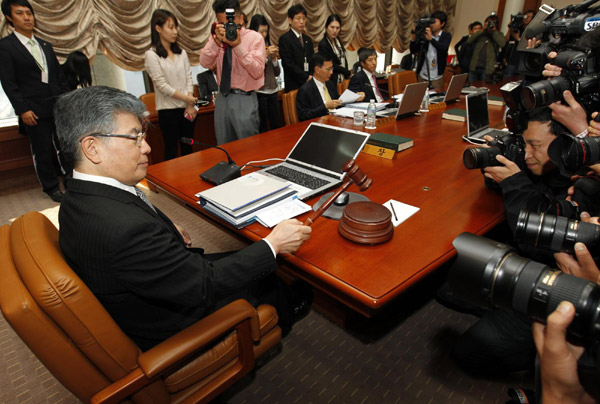BOK freezes key interest rates at 3.25%
Updated: 2011-10-13 09:42
(Xinhua)
|
|||||||||||
 |
|
Bank of Korea Governor Kim Choong-soo uses a gavel during a photocall before presiding over the Monetary Policy Committee meeting at the bank's headquarters in Seoul October 13, 2011. [Photo/Agencies] |
SEOUL - The Bank of Korea (BOK) left its benchmark interest rate unchanged at 3.25 percent on Thursday, keeping its rate freeze stance for a fourth straight month, following an unexpected rate hike in June, due to lingering external uncertainties such as Europe's debt crisis and the global economic slowdown.
Governor Kim Choong-soo and monetary policy board members decided to freeze the 7-day report rate at 3.25 percent this month after raising the rate by 25 basis points (bps) in January, March and June each. The BOK has lifted the borrowing costs by a total of 125 bps in five steps since July last year.
The decision was in line with market expectations as most experts forecast the central bank would delay its rate normalization process amid remaining external uncertainties.
The BOK was widely expected to freeze its policy rate this month due to lingering uncertainties surrounding debt and growth prospects in the United States and Europe. The rate freeze was accepted among market watchers as a foregone conclusion after both the major European central banks opted to adjust policy in an easier direction. Some experts even predicted the BOK's rate cut early in 2012.
The European Central Bank (ECB) unveiled its plan last week to purchase 40 billion euros ($53 billion) in covered bonds and offer the region's banks unlimited loans with 12- and 13-month maturities. The Bank of England (BOE) decided to expand its bond purchase program to 275 billion pounds ($421 billion) from 200 billion pounds.
Other central banks in emerging nations showed signs of softening their anti-inflation stances. Brazil's central bank unexpectedly cut its policy rate by 50 basis points (bps) to 12 percent on August31 after raising the rate five times this year. Bank Indonesia surprised markets on Tuesday with a 25 bps cut to bring its policy rate back to a record low of 6.5 percent after lifting the rate by 25 bps in February, and Australia's central bank signaled a possible rate cut if inflationary pressures ease.
"South Korea's inflationary pressures stemmed mainly from supply-side factors, but those pressures have been eased recently. The BOK is expected to cut its key rate two or three times in early 2012," Jun Min-kyu, an economist at Korea Investment & Securities, said before the rate decision.
However, most experts said speculation for the rate cut was premature given the remaining high inflation. "Although some started to bet that the central bank will lower the policy rate as external conditions are more likely to worsen than improve, the odds of a rate cut at this time are pretty low," said Yoon Yeo- sam, a fixed-income analyst at Daewoo Securities.
Amid growing worries about global economic conditions, the South Korean economy has recently showed signs of slowing down in exports and industrial activities. Production in the nation's mining and manufacturing sectors shrank 1.9 percent on-month in August after posting a 0.3 percent on-month contraction in July. The factory utilization rate of local manufacturers dropped to 80. 5 percent in August from 82.1 percent a month earlier, while retail sales recorded a 0.2 percent on-month contraction in August.
Exports, which account for around 50 percent of the Asia's No.4 economy, grew at a slower pace in September than the previous month due to weaker demand from advanced countries. The country's trade surplus contracted to 1.44 billion dollars in September from 4.41 billion dollars tallied in August on slower exports growth. The state-run Korea Development Institute (KDI) said in its monthly report on economic conditions on Monday that the South Korean economy saw exports growth slow down due to spreading external uncertainties.
Optimism has recently spread that the US economy may not as weak as concerned after the release of better-than-expected payrolls, but experts warned that the improvement in the data might be no more than a one-off surprise. "One swallow does not make a spring. The US non-farm payrolls increased more than 100,000 in September, but it is entirely possible for the improvement to be no more than one-off surprises," said Yoon.
Hot Topics
Libya conflict, Gaddafi, Oil spill, Palace Museum scandal, Inflation, Japan's new PM, Trapped miners, Mooncake tax, Weekly photos, Hurricane Irene
Editor's Picks

|

|

|

|

|

|







